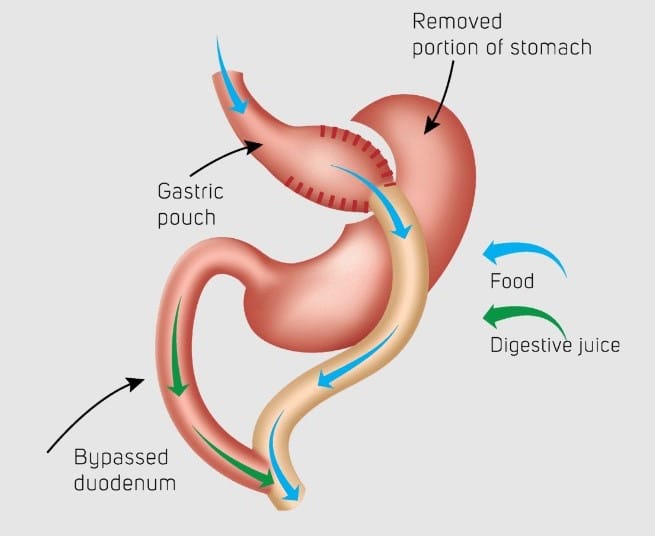RNY Gastric Bypass surgery, also known as Roux-en-Y Bypass, is one of the most widely performed bariatric procedures, and it’s recommended for patients who are struggling with obesity and related health issues. This surgery promotes weight loss by altering the digestive process, reducing both the stomach’s size and the body’s nutrient absorption.
In the Roux-en-Y procedure, the stomach is carefully reshaped into a smaller pouch and re-routes a portion of the small intestine to limit calorie and nutrient intake. This not only promotes weight loss but also reduces the body’s intake of fat and sugar.

Gastric Bypass is often recommended for patients who have not achieved significant weight loss through diet and exercise alone. For patients dealing with acid reflux or hiatal hernias, this procedure is also effective in reducing symptoms. Additionally, the procedure can alleviate conditions such as high blood pressure, type 2 diabetes, heart disease, sleep apnea, and other obesity-related health issues.
The decision for surgery is based on comprehensive criteria, including:
Dr. Tuna Bilecik and the Bariatrics & Beyond team provide detailed pre-surgery counselling to ensure you’re informed and well-prepared.
Patients must follow a pre-surgical diet, including a liver-shrinking plan. Twelve hours before surgery, patients must abstain from food or drink. Additional precautions include stopping certain medications, like Vitamin K, and avoiding alcohol, smoking, and hormonal contraceptives.
Dr. Bilecik performs the procedure laparoscopically, minimizing invasiveness. Small incisions are made, allowing the surgeon to reshape the stomach into a small pouch and re-route part of the small intestine, forming a Y-shape connection that reduces caloric intake.
Patients will receive a detailed dietary plan to support recovery and prevent any complications. Initial post-surgery stages include a liquid diet, progressing to purees and then to solid foods after six weeks. Patients are advised to avoid certain physical activities, follow a cautious reintroduction to exercise and reduce calorie intake.
Short-term complications can include bleeding, infections, and blood clots, although these are minimized through careful monitoring.
Long-term risks like vitamin deficiencies mean patients must commit to lifelong nutritional supplements.
Dumping syndrome, gallstones, and rare complications like hypoglycemia or reflux may occur but are manageable with lifestyle adjustments.
Can lead to rapid weight loss, with up to 75% of excess weight typically lost within the first year.
Resolves or alleviates issues like type 2 diabetes, hypertension, sleep apnea, and osteoarthritis.
Positive hormonal changes can reduce appetite and increase satiety, supporting lasting weight loss.
If you choose gastric bypass surgery with Bariatrics & Beyond the cost will be £4,200. This covers all surgical assessments, the Roux-en-Y procedure, three nights’ stay at Acıbadem Adana Hospital for yourself and a companion, plus a further night at a nearby luxury hotel to aid your recovery (as well as all airport-hospital-hotel transfers). The price also includes all pre and post-surgical dietary and medical support through our expert UK-based team.
At Bariatrics and Beyond, we offer transformative weight loss and plastic surgery in Adana, Turkey, empowering patients to reclaim control of their weight loss journey and live life to the fullest.
© 2025 Bariatrics and Beyond. All Rights Reserved.